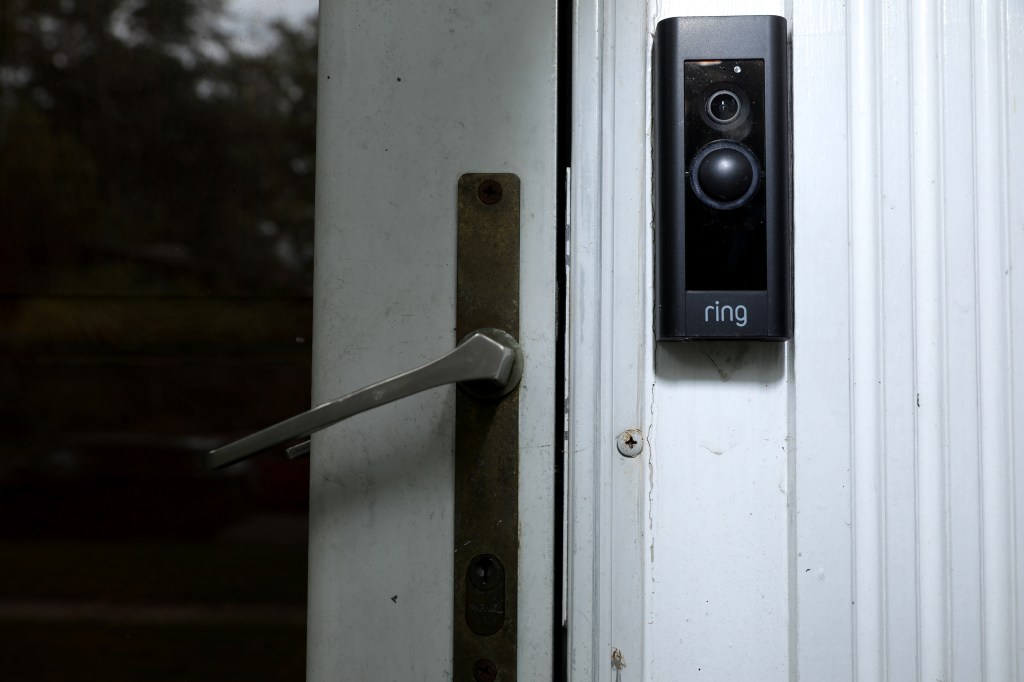Early Saturday morning, a Florida man and his teenage son were arrested after allegedly shooting at and nearly killing a woman sitting in her car after receiving a Ring doorbell camera alert.
After a neighbor stopped by Gino (73) and Rocky (15) Colonacosta’s front door to drop off prescription medication accidentally delivered to the wrong address, the Ring surveillance camera began bombarding their phones with alerts.
Videos by VICE
The pair grabbed .45-caliber handguns, went outside looking for a burglar, and found a woman sitting in her car on her phone. Gino pointed the gun at her and ordered her out of her car, but she escaped in her car believing she was being carjacked. The pair allegedly shot at her seven times according to police; in a press conference on Monday, Poly County Sheriff Grady Judd claimed one round passed through an empty child seat in the vehicle.
“They go out searching for a burglar that wasn’t there and shot up an innocent lady’s car while she was in it,” Judd said. “That’s crazy!”
Thankfully, no one was killed, but if she had been shot it wouldn’t have been the first time a Ring surveillance camera played a role in someone’s death. In October 2021, a man in England learned four people were breaking into his home through his Ring surveillance camera alerts, then went home and stabbed one of the burglars to death. The man was later found guilty of manslaughter and jailed for 19 years.
Still, some may claim that the Ring surveillance camera had nothing to do with this incident. When I shared this story on Twitter, a small but vocal contingent insisted Ring surveillance cameras are not implicated because the humans, not the tech, shot the handguns. Some replied that this was a mental health issue, although no details were released to suggest this. Given the popularity of Ring cameras, it’s not unreasonable to assume a lot of people view Ring surveillance cameras this way.
So let’s try to be clear about this. We understand what’s going on when people make similar arguments about guns; when someone says that guns don’t shoot people, people shoot people, we understand the rhetoric intent there is meant to pre-empt any discussion of gun control. Similarly, a Ring camera doesn’t force someone to go and shoot at an innocent person, but both Ring cameras and handguns exist to amplify some tendencies and enable different actions, which in this case resulted in violence. Arguing that a piece of surveillance technology is okay so long as you or other people like you use it for good reasons is not only muddle-headed, but preempts any discussion around corporate surveillance and its outcomes. Technologies are not neutral tools: they’re intentionally designed, often to be used even at great cost to the user by obscuring the harms or packaging them up with “good reasons” that seem undeniable.
We should think critically about whether even the “good reasons” are actually, you know, good.
As a report from Data & Society recently found, a Ring owner may be bombarded with alerts that allow them to track packages, surveil overworked delivery workers, and even punish them by way of public humiliation. Amazon has “managed to transform what was once a labor cost (i.e., supervising work and asset protection) into a revenue stream” by selling surveillance tech (e.g. Ring) and subscription services (e.g. Prime) that lets you perform that labor, the report states.
More relevant to the Florida case is Ring’s well-documented pattern of cultivating paranoia to sell cameras. Amazon’s Ring is powered by the Neighbors app—a virtual neighborhood watch that encourages people to racially profile, spy on, and snitch on their “suspicious” neighbors—which shares Ring surveillance footage with police departments.
Cultivating that paranoia is a key thread of the company’s revenue stream here, but it goes even further. This doesn’t simply translate into a vague sense of hostility in your neighborhood, but the gamification of harassment, policing, and criminalization of Black and brown people. At the same time, Amazon is continuing to build an even wider surveillance dragnet that will sweep up private and public spaces—Alexa, Astro, Echo, Sidewalk, the list of new Amazon surveillance tech grows every quarter.
In July of last year, 48 civil rights and advocacy groups sent a letter to the Federal Trade Commission asking it to ban corporate surveillance of public spaces, specifically because Amazon uses it as part of a strategy to shore up its economic empire. Pervasive surveillance was key to its monopolies, but at great costs to our politics, social relations, and economy. Is the cost worth minor conveniences?
“Rulemaking is needed to stop widespread systematic surveillance, discrimination, lax security, tracking of individuals, and the sharing of data,” the letter reads. “While Amazon’s smart home ecosystem, facial surveillance technology, and e-learning devices provide a good case study, these rules must extend beyond this one technology corporation to include any entity collecting, using, selling, and/or sharing personal data.”
The coalition calls for these forms of corporate surveillance to be banned outright and similar forms to be closely regulated, limited, and banned whenever possible. The argument is that using the population at large to cultivate harmful social and political patterns while testing new products or services that might be lucrative should be illegal, especially when surveillance comes into the picture.
But you don’t have to wait around for the government to act here. You can always throw your surveillance camera away, or talk to your friends and loved ones and neighbors about getting rid of theirs. There’s no reason why any of us should be foot soldiers in Amazon’s campaign to spin corporate surveillance into the highest form of consumer convenience.





